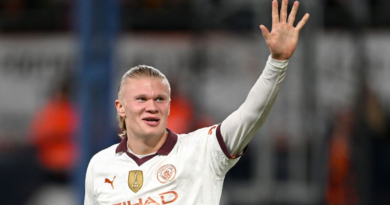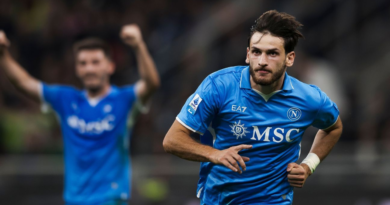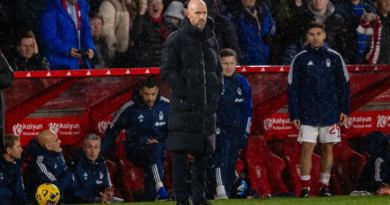Bono embodies humility and spirit of Morocco's magical World Cup
Up close, there are hints of Gianluigi Buffon about Yassine “Bono” Bounou. The Morocco goalkeeper, who needs just one more of his already legendary performances in Qatar to propel the Atlas Lions into the World Cup final, isn’t quite Buffon’s twin, but they could easily be brothers. The mop of dark hair, the chiselled profile, the facial skin tone, identical height and their big, rangy frames evoke outdoorsmen who could, back in the day, have built a cabin, fenced a ranch and wrangled horses or run logs down river in midwinter.
They are hardy men.
– World Cup 2022: News and features | Schedule | Bracket
It’s also true that the last team to reach a World Cup semifinal having conceded just once in five tournament matches — Bono and Morocco’s current record — had Buffon in goal, in 2006, as Italy (2-0, 1-1, 2-0, 1-0, 3-0 against Ghana, United States, Czech Republic, Australia and Ukraine) eventually won the tournament that year.
Somewhat spooky is the fact that Italy met Zinedine Zidane’s France in Berlin, 16 years ago, having conceded only an own goal on their way to the final (Cristian Zaccardo against the US). Meanwhile, Morocco, already the first Arabic and first African nation to compete in a World Cup semifinal, have also seen Bono beaten by only an own goal, when he was beaten by teammate Nayef Aguerd against Canada.
You can choose which of the quirky story elements make a surprise World Cup semifinalist more interesting: the fact that his surname isn’t Bono, but Bounou, or that he speaks English with an Arabic accent, but Spanish with a very distinct Argentine accent; the fact that the football club he’s most passionate about is Buenos Aires giants River Plate; the fact that prior to this competition, his greatest fame concerning penalties was shouting the made-up word “Kiricocho!” at Erling Haaland to try to deter the Norwegian star from scoring; the fact that this Moroccan man was actually born not only in a different country, but continent (Montreal, Canada); or that his dog sounds as if he’s named after a Disney mermaid but actually isn’t.
However, if there’s a defining characteristic about this 31-year-old, who learned to play football on the uphill slope of a Casablanca supermarket parking lot where he and his pals pulled huge garbage containers together to make goalposts, it would be his intense humility. So down-to-earth and ordinary is he that despite already being a Europa League winner by then, when Youssef En-Nesyri — whose towering leap and headed goal put Morocco into Wednesday’s semifinal against France — joined Sevilla, Bono actually worried that the newly arrived striker wouldn’t be his friend.
“Youssef is like my younger brother,” Bono once told me. “Whatever bothers him bothers me, and likewise with whatever makes him happy, too. I look on it as a great honour to be playing alongside such a wonderful footballer, for club and country, but the day he arrived, I was nervous. I didn’t know whether we would get along or indeed whether he would get on with the rest of the squad knowing that he has ‘quite a personality.'”
When you interview this likeable, talented, low-key man, you’ll do well to get an anecdote or even see behind his flawless poker face. This isn’t a criticism, mind you: I was 10 feet away from him in the Education City stadium when he was told he’d been named Player of the Match for his solid performance and two penalty saves (from Carlos Soler and Sergio Busquets) that eliminated Spain.
Watching the event was low-key comedy. Players from Muslim countries don’t pose with the Budweiser backdrop to their MOTM interviews, so it just looked like any old postmatch interview. And when Bono responded to the first question with “I’m so happy for the team …” it was delivered with a completely blank face, devoid of any joyful expression, and with a flat, monotone voice that could have been a homage to K-Billy’s Super Sounds of the ’70s from “Reservoir Dogs” (or the deadpan comedian, Steven Wright, who played him).
By the time Morocco eliminated Portugal? Boy, were things different. Player of the Match again, Bono was beaming from ear to ear. His voice didn’t carry euphoria, but the moment was drenched in the impact of what he and his national team had achieved.
First, midfielder Yahya Jabrane burst into the so-called “flash” interview, draped in a Morocco flag, and grabbed Bono so that he could plant a kiss on his cheek. The keeper’s demeanour was unruffled, but his look appeared to say Ahh, you big galoot … I’ll allow it this time. A few seconds later, when asked to whom he’d gift his award, he not only nominated his “little brother,” club teammate and winning scorer En-Nesyri, but yanked the striker into the interview and handed him the trophy so that they could then pose together, after which Bono stepped out of the spotlight.
It was a classic Bono thing to do; eventually, he stepped back in to conclude the interview, but this time with his two-year-old son, Isaac, in his arms. The kid, thinking the microphone was a big lollipop, twice tried to lick or bite the thing much to his father’s amusement.
That theme of family has been gigantic for Morocco thus far. There have been sensational images of players seeking out loved ones, usually their mothers, in the stands and celebrating with unrestrained emotion. Little Isaac Bounou and his dad left the interview area and nipped on to the Al Thumama pitch so that they could kick a ball about.
Imagine when the kid looks back on those images in later life: what he’ll feel, what he’ll owe his doting dad. Imagine what Yassine Bono felt there and then in that shared moment of ecstasy. Incalculable.
1:25
Gab Marcotti praises Morocco for their win vs. Spain but criticises Luis Enrique for his tactical decisions in the loss.
Coach Walid Regragui had a good explanation for that theme: “Before Qatar, we had a strategy meeting about whether or not to bring families with us. Based on our experience in 2018, we chose the option to bring the families. Some players have kids, while some would rather have their parents with them. We did a good job in that regard.
“When you win, there’s no negatives, everyone is happy, but, if you lose, people will say ‘why did you bring the families?’ But the power of family spirit is something we want to bring onto the pitch: until now, it’s functioning very well.”
Happy scenes, indeed. Happier still, of course, if Regragui’s team win at Al Bayt Stadium on Wednesday and become inarguably the greatest underdog story in 92 years of World Cup history.
Bono’s goals-against record has of course been helped by the fact that the men in front of him have allowed only 11 efforts on target across 510 competitive minutes in Qatar. It means that the availability — and it’s very hard to imagine that both make it — of first-choice central defenders Romain Saiss and Aguerd might be extremely influential in which team progresses to meet Argentina or Croatia.
It’s remarkable too that this semifinal is the first competitive meeting between France and Morocco. That said, the Atlas Lions will always have Casablanca, where they beat Les Bleus 6-5 on penalties after a 2-2 friendly in the warm-up weeks before World Cup ’98.
Initially, of course, Bono will simply be praying for an inspired performance and a win. But on another level he’ll be beseeching the football fates that the final can be him and Morocco against Argentina: a country and a football culture he adores.
When he was young, Bono’s parents gave him a Gabriel Batistuta shirt — Bono was a striker long before being converted to a keeper — and his all-time favourite player, by far, is Ariel “the Little Donkey” Ortega, after whom the family’s dog is named (not Ariel from “The Little Mermaid”).
When the Boca Juniors vs. River Plate “Superclasico” Copa Libertadores final, second leg, was relocated to the Santiago Bernabeu in Madrid four years ago, Bono was somehow able to conjure up two tickets. River won on a 5-2 aggregate: cue the fiesta.
More devoted still: Bono and some friends, dressed in River Plate shirts, flew to Japan for the World Club Cup final in 2015. Los Millionarios were humbled 3-0 by Luis Enrique’s Barcelona, which, if you think about it, meant that last week’s elimination of that same coach’s Spain side was some revenge that Bono served cold.
Papu Gomez, a Sevilla teammate and potential opponent if Messi & Co. meet Morocco in Sunday’s final, has been heard to tell people in Lionel Scaloni’s squad: “Bono? He’s more Argentine than me!” That might account for the “Kiricocho!” anecdote.
Carlos Bilardo was Argentina coach when the Albiceleste won the World Cup in 1986. During Bilardo’s club career there was, he alleges, a fan named ‘Kiricocho‘ (or something similar), whom he hated to see in the stadium because Bilardo passionately believed that the fellow brought bad luck. Bilardo’s extreme hatred for the very name meant that for a generation of Argentine footballers of a certain age, “Kiricocho!” became a word via which you wished bad luck on anyone to whom you shouted it.
When Sevilla, with Bono in goal, faced Borussia Dortmund in the Champions League last year, the keeper (who has never even been to Argentina) yelled ‘Kiricocho!‘ three times at Haaland as the giant Norwegian ran up to take a penalty. Bono saved it, to huge acclaim, but the referee ruled it had to be retaken. Haaland yelled “Kiricocho!” back at Sevilla’s keeper immediately prior to scoring the retake, and then sprinted up to Bono to mock and provoke the beaten keeper. The two men buried the hatchet postmatch, with Haaland admitting he’d had no idea what the word meant, or why Bono had it shouted at him, but had simply decided to retaliate.
It was Bono’s most famous penalty, at least until Morocco played Spain at Education City. Then, at the weekend, Portugal came and went. Now it’s France’s turn.
For all the talk about being born in Canada, his love for Argentina and a career blossoming in Spain, Bono is a Casablanca boy at heart. Beat France in the semifinal, and any Moroccan streets with no name will carry Bono’s from now on.




